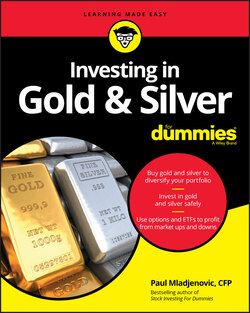Читать книгу Investing in Gold & Silver For Dummies - Paul Mladjenovic, Paul Mladjenovic, Ted Sudol - Страница 17
Cash and bank investments
ОглавлениеTypically, if you have a savings account, checking account, certificates of deposit, and other bank instruments, these don’t have market risk. In other words, they’re not usually traded in some marketplace and subject to fluctuation, and they don’t go up or down as you normally see, such as in the stock market. You know that if you put, say, $1,000 in a bank savings account in January, you could reasonably expect that money (plus some interest) to be there in December (unless you gave access to that relative who goes on spending binges).
U.S. banks are considered among the safest banks in the global financial arena, but don’t assume 100 percent safety at all times. When times are extraordinarily difficult, the safety of your funds can be an issue. Bank safety was a major issue during the Great Depression, and as you read this, U.S. banks have entered times that may again be considered difficult, so stay alert. If you suspect that your bank has issues, you can find out about the bank’s safety from sites such as www.fdic.gov.
Cash — whether it’s in your pocket, your sock drawer, that crevice in your couch, or any bank or credit union account — is subject to inflation risk. Inflation risk is a form of counterparty risk.
Inflation means that more dollars (or whatever the currency is) are being overproduced so that more dollars are chasing the same basket or goods or services (or, as in the case of bubbles, chasing assets). When more and more dollars are produced, and these dollars head into the purchase of something, that “something” will see its price rise. Monetary inflation (problem) leads to price inflation (symptom).
So, where is the counterparty risk? Monetary inflation comes from the management of the currency; it doesn’t “just happen.” It’s a direct result of the performance of those in charge of the currency. The “managers” of the currency are the folks at the central bank charged with the creation and management of the currency (also referred to as the “money supply”). Those who manage the currency are said to be conducting “monetary policy.” Ultimately, the central bank will generally follow the edicts of the political leaders, and seriously, what political leaders are immune to the idea of inflating the currency? It’s like creating money out of thin air.
It will happen when they want to be popular with the electorate and spend, spend, spend. This is why we have trillions in national debt. This is how entire countries bankrupt themselves. This is why hyperinflation has commonly dotted history’s landscape.
A currency is only as good as the performance of the counterparty, the issuer (the federal government). If the currency is mismanaged (overproduced!), the currency loses value (perceived or otherwise) and (as history shows) often goes to zero (becomes worthless).
